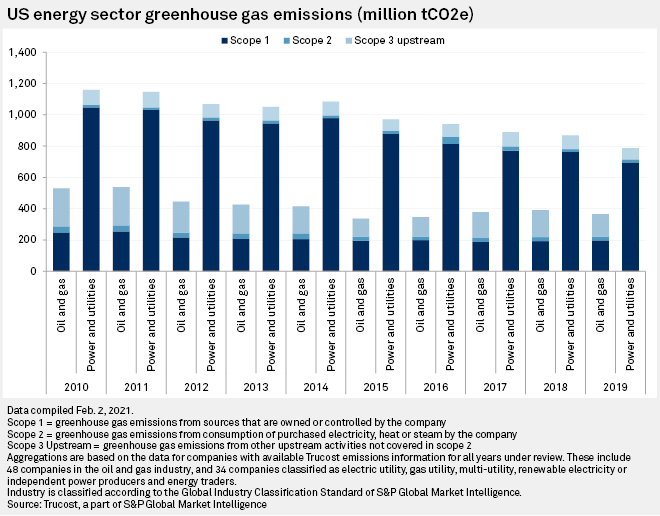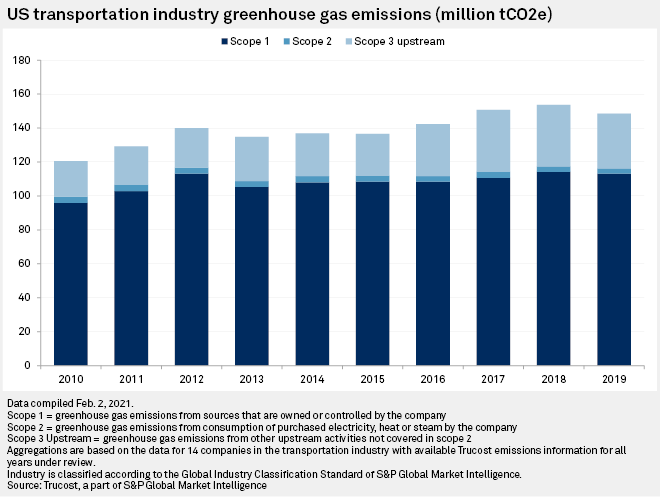S&P Global Offerings
Featured Topics
Featured Products
Events
S&P Global Offerings
Featured Topics
Featured Products
Events
S&P Global Offerings
Featured Topics
Featured Products
Events
Banking & Capital Markets
Economy & Finance
Energy Transition & Sustainability
Technology & Innovation
Podcasts & Newsletters
Banking & Capital Markets
Economy & Finance
Energy Transition & Sustainability
Technology & Innovation
Podcasts & Newsletters
S&P Global Offerings
Featured Topics
Featured Products
Events
3 Feb, 2021

By Molly Christian
The new chair of the U.S. Senate Energy and Natural Resources Committee said the country's efforts to address climate change cannot exclude fossil fuel-based energy, potentially setting the tone for the committee's work on the issue in the new Congress.
Joe Manchin, D-W.Va., who now leads the committee after the Senate voted Feb. 3 on an organizing resolution for the 117th Congress, made his remarks during the energy panel's first climate hearing of the year held earlier that same day.
"Although fossil fuel consumption is dropping in the U.S. power grid, the global trends in fossil fuel use should make us all recognize that fossil fuels aren't going anywhere anytime soon, particularly in countries that are seeking to expand access to electricity and energy in order to address poverty," Manchin said.
Repeating a common refrain from Democrats and Republicans, Manchin said technological innovation will be key to reducing emissions, including from carbon-intensive energy resources such as coal and natural gas.
"By pursuing an all-of-the-above energy policy and a broad array of [emissions-reducing] technologies, we can simultaneously build our technology export opportunities and, diplomatically, relationships with those countries who choose to utilize their own fossil resources," Manchin said.
Manchin's comments could signal that his committee will take a moderate approach to climate policy during the next two years. U.S. President Joe Biden and top congressional Democrats have called for aggressive legislation to curb global warming. But Manchin represents one of the largest U.S. coal-producing states, requiring him to balance the opportunities of the clean energy transition against its potential downsides for West Virginia.
"The energy transition has increased hardships in the areas of the United States that have powered our nation for decades by mining its coal, producing its fuel and generating its electricity," Manchin said. "As our energy mix has changed, concern about the impacts on these traditional energy communities has and will remain front of mind for many of our members. I will continue to work hard to ensure that those communities are given new opportunities to thrive."
With control of both the White House and Congress, Democrats are making climate action a key policy focus. On Feb. 3, Senate Majority Leader Chuck Schumer, D-N.Y., said he instructed incoming chairs of relevant committees to hold hearings on climate change to help enact Biden's Build Back Better agenda, which includes major climate provisions.
"As the Biden administration prepares a whole-of-government approach to combating climate change, the Democratic majority will pursue a whole-of-Senate approach as well," Schumer said.
Top Republican blasts Biden climate plan
The Senate energy committee's top Republican said he hoped to work with Manchin on bipartisan legislation but called Biden's climate policies — including a temporary ban on new oil and gas leases in federal areas — "indefensible."
"I think we have to stop fooling ourselves into thinking that eliminating U.S. fossil fuel production is going to solve the problem," said Sen. John Barrasso, R-Wyo., the Senate energy committee's ranking member. "It won't. It will just make America less competitive and less energy secure."
Barrasso said expecting other major emitters such as China, India and Russia to stop using fossil fuels is "unrealistic" and noted that U.S. carbon dioxide emissions now account for just 14% of the global total, down from 25% 20 years ago. During that same period, China's share of worldwide emissions has jumped from 13% to 30%.
"At its most fundamental level, reducing greenhouse gas emissions is a technology challenge," Barrasso said. "Instead of raising the costs of traditional energy sources, we should work to lower the cost of alternative technologies like carbon capture and advanced nuclear reactors."

Energy experts endorse range of options
Witnesses at the Feb. 3 hearing offered a range of ideas for how the U.S. can encourage both domestic and international emissions cuts.
International Energy Agency Executive Director Fatih Birol said technologies such as wind and solar power, hydroelectric generation and nuclear energy are ready for markets but are "by far not enough to reach our climate goals," including Biden's target to achieve net-zero U.S. greenhouse gas emissions economywide by 2050.
Birol asked for more support for breakthroughs on carbon capture and sequestration, hydrogen and advanced nuclear power, along with policies to lower methane emissions from oil and gas production. Birol praised Congress' passage of an extension to the Section 45Q tax credit for carbon capture and sequestration and said additional incentives are needed to support clean energy development.
Richard Newell, president and CEO of nonprofit research institute Resources for the Future, also said a wide range of technologies is needed to decarbonize the economy, particularly for the transportation sector.
Transportation surpassed the power sector in 2017 as the biggest emitter of U.S. greenhouse gas emissions, according to Newell's testimony. Although the cost and range of electric vehicles have improved in the past decade, other transportation segments such as aviation, shipping and long-haul trucking are harder to electrify, driving the need for new technologies such as low-emission liquid fuels, hydrogen and other options, Newell said.

Mark Mills, a senior fellow at the Manhattan Institute, said the U.S. could revitalize domestic mining and processing of energy minerals to create a stronger domestic supply chain for renewable resources.
Investing in clean energy technologies will not only help stave off the impacts of climate change but present a major economic opportunity, another panelist stressed. China produces two-thirds of the world's wind turbines and half of its solar panels, meaning they are "basically eating all other countries' lunch" on renewable energy manufacturing, said Angel Hsu, an assistant professor at the University of North Carolina.
"By sticking to these old fossil fuel-based industries that our economy has relied on to achieve the emissions reductions in the past decade, I think it's short-sighted," Hsu said. "I think the world is moving in the direction of decarbonization, and if the U.S. doesn't act quickly and decisively enough, they're going to miss an opportunity."
